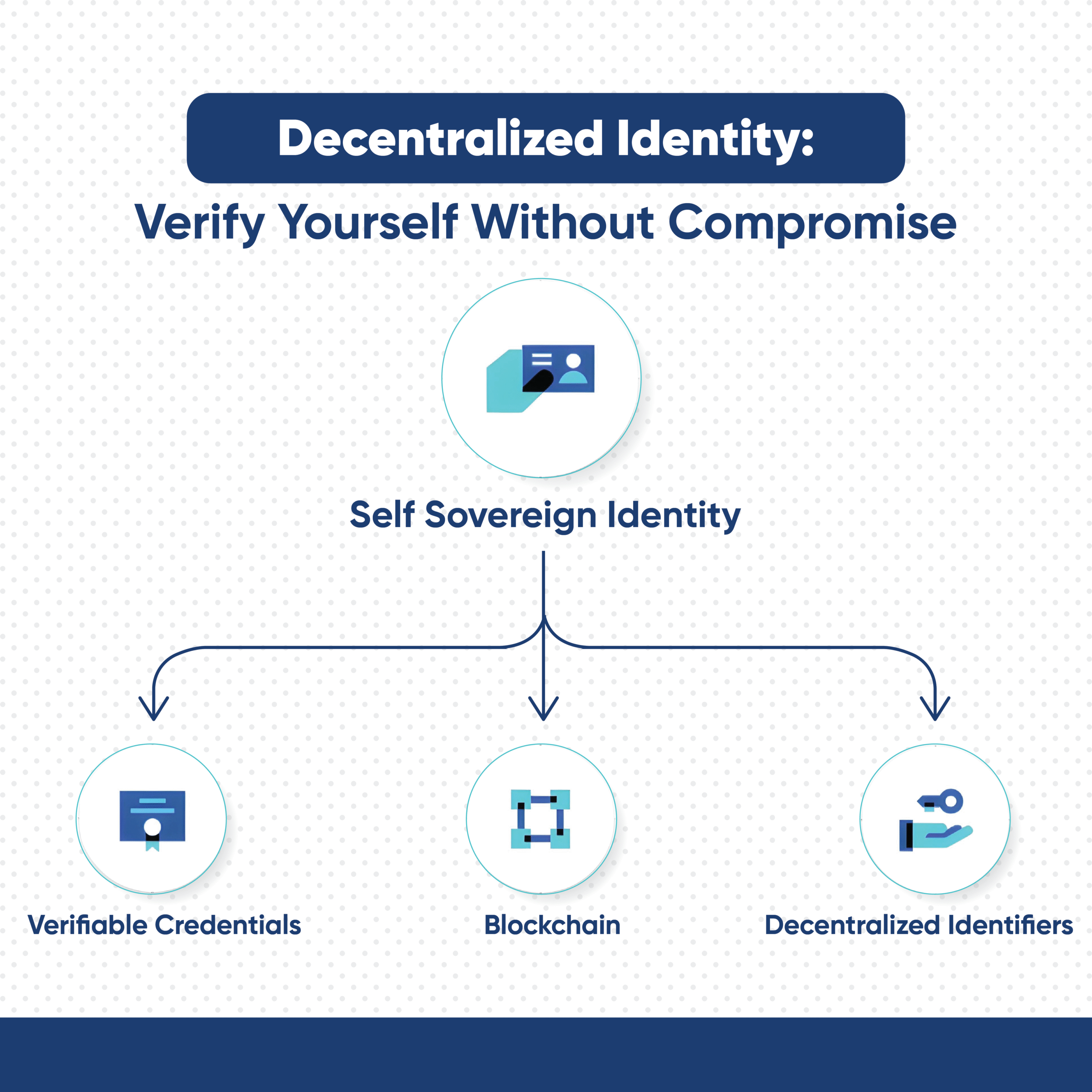Let’s get one thing straight—compliance isn’t going anywhere. But that doesn’t mean crypto needs to give up its soul. Somewhere between the wild-west anarchy of early DeFi and the suit-and-tie world of institutional finance lies a middle ground. That sweet spot? It’s being shaped by Decentralized Identity (DID)—a tech trend that’s quietly redefining how trust, access, and privacy can co-exist. If you’re picturing another acronym dump, don’t. This is where crypto gets classy without losing its cool.

What is Decentralized Identity (DID)?
Decentralized Identity is exactly what it sounds like—your personal ID, but without a central authority acting as the gatekeeper. It’s built on blockchain tech and uses cryptographic methods (like zero-knowledge proofs) to give users control over their credentials. No middlemen, no giant data silos ripe for breaches. Just you, your data, and the right to share only what’s needed.
Instead of logging into a finance platform with a username and password linked to a centralized database (which, let’s be honest, will be breached eventually), DID lets you authenticate using verifiable credentials issued by trusted entities—like your bank, employer, or government—but without constantly pinging them every time you log in.
Institutions Are Curious… But Cautious
Big money is sniffing around DeFi like a shark that smells blood—but isn’t quite ready to dive in. Why? Because it’s a compliance minefield. Know-Your-Customer (KYC) and Anti-Money Laundering (AML) rules are strict, and you can’t just YOLO into a protocol with someone’s pension fund.
That’s where DID steps in. It lets users prove they meet regulatory requirements (like age, residency, accreditation status) without revealing more personal info than necessary. Think of it like showing the bouncer you’re 21 without handing over your entire driver’s license.

Enter Permissioned DeFi: The VIP Lounge of Crypto
Now, let’s talk about Permissioned DeFi—essentially a curated DeFi space designed with compliance and regulation in mind. These are smart contract-based ecosystems, but only accessible to pre-verified participants. Think institutional-grade DeFi with a velvet rope.
Platforms like Aave Arc and Compound Treasury have already started exploring this model. They let institutions access the liquidity, yield, and programmability of DeFi—but with guardrails.

How DID Fits Into the Picture
In these ecosystems, DID acts like the keycard to get past security. It verifies whether you meet the access requirements—say, being a licensed money manager in the EU—without revealing who you are to everyone else on-chain.
Here’s how it works:
- DID Wallet: You control it. It stores your credentials.
- Verifiable Credential Issuers: These are trusted parties (like KYC providers or government entities) who issue proof of your credentials—think of it as the blockchain version of a background check.
- Zero-Knowledge Proofs (ZKPs): This is the magic sauce. ZKPs allow you to proveyou meet certain criteria without showing the actual data.
So, in a permissioned DeFi setup, you could participate in a lending pool after proving your eligibility using your DID—no need to dox yourself on-chain.
Balancing Privacy and Regulation
It’s not just about convenience—it’s about aligning with the GDPR, FATF Travel Rule, and emerging crypto compliance frameworks. DID makes it possible to preserve user privacy while still satisfying regulators’ demands for identity verification, audit trails, and anti-fraud mechanisms.
Instead of full transparency (which DeFi purists love) or total anonymity (which regulators loathe), DID creates a middle layer. It’s a “trust but verify” system—with cryptography as the referee.
Real-World Examples That Are Actually Happening
This isn’t just theory.
- Circle(yep, the USDC folks) has hinted at integrating DID for compliance-focused stablecoin use cases.
- Aave Arc, as mentioned earlier, requires participants to pass KYC via Fireblocks, but the identity data stays off-chain.
- Polygon IDis pushing hard into decentralized identity, letting users store and present credentials privately across apps.
- KILT Protocolenables identity attestation on Polkadot, blending DID into a multi-chain environment.
These aren’t fringe experiments—they’re serious moves by projects that see the writing on the wall: DeFi needs to grow up, without selling out.

Why This Matters for Institutional Finance
Institutional players—banks, hedge funds, pension managers—need two things to get off the sidelines:
- Compliance Assurance: They can’t risk being shut down by regulators.
- Privacy Control: They can’t expose their strategies, clients, or capital flow to every wallet address on-chain.
DID solves both.
It enables private, permissioned access to public infrastructure. It turns on-chain anonymity into selective transparency—the kind regulators can work with, and that institutions can trust.
What Comes Next?
Here’s the exciting part: as more interoperable DID frameworks emerge (think W3C standards, blockchain-agnostic identity solutions, and zk-rollups), we’ll see a surge in hybrid DeFi models. These will be:
- Private enoughto protect competitive intelligence
- Transparent enoughto satisfy regulators
- Programmable enoughto unlock automated compliance
In other words, we’re heading toward a future where you can have your DeFi cake and eat it, too. Whether you’re a hedge fund manager, a DAO, or just a crypto-native trying to stay off the regulator’s naughty list, DID is shaping up to be a cornerstone of the next phase of financial innovation.
Don’t Sleep on This
DID might not have the meme power of Dogecoin or the hype of the next altcoin moonshot—but in terms of actual impact? It’s massive.
This is the tech that’ll open the floodgates for real institutional participation in blockchain—without blowing up the ethos of decentralization. It’s the ultimate flex: compliance without compromise.
Discover Blockchain Excellence with Kenson Investments
At Kenson Investments, we offer top-tier digital asset support to help you navigate crypto asset markets. Our team of digital asset specialists is dedicated to providing legitimacy and transparency in blockchain asset investments. Blockchain asset investments consultant services are available to guide clients through secure and compliant crypto strategies. We also offer DeFi Finance consulting services to help you leverage decentralized finance opportunities. If you’re launching a new venture, our Digital asset consulting for startups ensures you build on a solid foundation. As a trusted Digital asset strategy consulting firm, we tailor solutions to meet your specific goals.
Call now to explore how we can help you in this dynamic market!
Disclaimer: The information provided on this page is for educational and informational purposes only and should not be construed as financial advice. Crypto currency assets involve inherent risks, and past performance is not indicative of future results. Always conduct thorough research and consult with a qualified financial advisor before making investment decisions.
“The crypto currency and digital asset space is an emerging asset class that has not yet been regulated by the SEC and US Federal Government. None of the information provided by Kenson LLC should be considered as financial investment advice. Please consult your Registered Financial Advisor for guidance. Kenson LLC does not offer any products regulated by the SEC including, equities, registered securities, ETFs, stocks, bonds, or equivalents”














